Diplomatic Bluebook 2020
Chapter 4
Japan's Diplomacy Open to the Public
Section 3 Diplomacy with the Support of the Public
1 Proactive Communications to the Public
(1) Overview
Public understanding and support are indispensable for the smooth implementation of Japan's foreign policy. As such, providing prompt and clear explanations on the policy details and on the role of the government is crucial. Accordingly, the Ministry of Foreign Affairs (MOFA) is making efforts in timely and effective public relations, using various forms of media, lectures, publications, and others.
(2) Providing Information through Domestic Media
MOFA has committed itself to promptly and accurately providing information through various media, such as newspapers, television, and the Internet, in order to gain the understanding and support of Japanese nationals for Japan's foreign policy. To provide information effectively, regular press conferences are conducted by the Minister for Foreign Affairs and the Press Secretary, while special press conferences are held as necessary. Press conferences by the Foreign Minister are open to various media including Internet media, and the records and videos of the press conferences are posted on MOFA's website. During overseas or local visits by the Prime Minister or the Foreign Minister, MOFA provides the information related to the visits from the countries/places so that people can quickly follow and understand the gist and the outcomes of the visits. MOFA also regularly releases statements by the Minister for Foreign Affairs or Press Secretary on specific international issues, announcing the stance of the Government of Japan. Similarly, MOFA frequently provides press releases on its daily diplomatic activities. Additionally, through various media appearances and interviews, the Minister and State Ministers for Foreign Affairs often explain the Government's foreign policies directly to the public. During large-scale international conferences such as the G20 Osaka Summit and the Seventh Tokyo International Conference on African Development (TICAD7) held in Japan in 2019, the International Media Center (IMC) was established to support activities of domestic and overseas media personnel at the location.
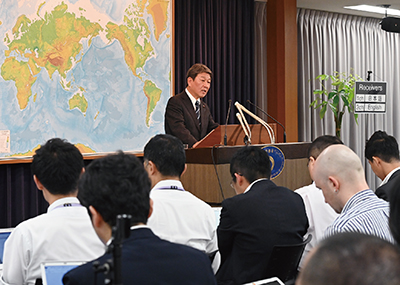 A Regular press conference (MOFA, Tokyo)
A Regular press conference (MOFA, Tokyo)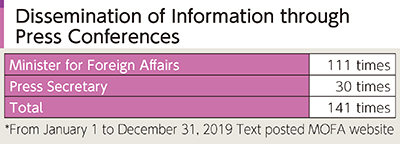
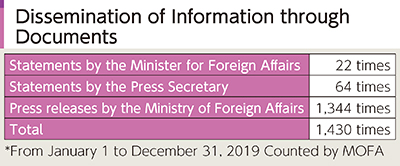
(3) Information Provision through the Internet
MOFA's website (in Japanese and English) is a way to promptly provide information on the diplomatic activities of the Prime Minister and the Foreign Minister as well as on Japan's foreign policy including territorial integrity, recognition of history, and security along with the latest international relations and other basic relevant information. In 2019, MOFA provided information about a variety of diplomatic events such as the G20 Osaka Summit and TICAD7.
MOFA's website in the Japanese language provides a variety of content for Japanese nationals across a wide range of levels, including the “'Anything Report' from Around the World” and “MOFA for Kids.”
In addition to this, MOFA provides a variety of information through various social media platforms.
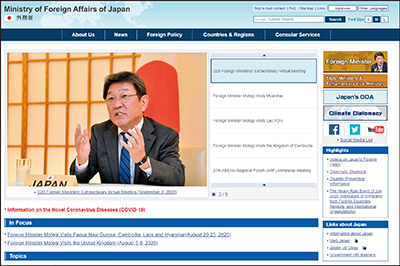 MOFA's Official Website:
MOFA's Official Website: https://www.mofa.go.jp/index.html
 MOFA's Official Website
MOFA's Official Website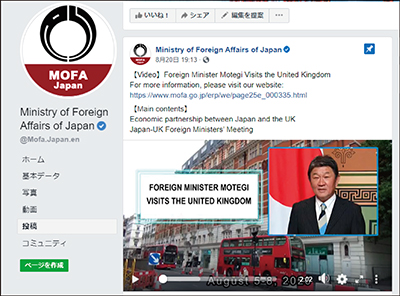 MOFA's Official Facebook:
MOFA's Official Facebook: https://www.facebook.com/Mofa.Japan.en
 MOFA's Official Facebook
MOFA's Official Facebook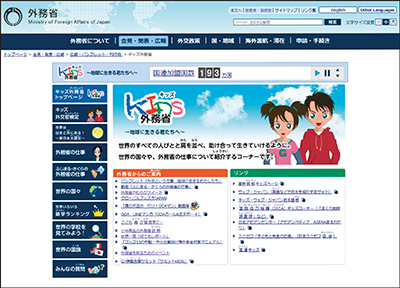 MOFA for Kids (only in the Japanese language):
MOFA for Kids (only in the Japanese language): https://www.mofa.go.jp/mofaj/kids/index.html
 MOFA for Kids
MOFA for Kids(4) Dialogue with Japanese Nationals
With the notion of “Public Relations through Dialogue,” MOFA provides the people of Japan with an opportunity to directly talk to the Minister for Foreign Affairs, the State Minister for Foreign Affairs, the Parliamentary Vice-Minister for Foreign Affairs, and MOFA officials.
As part of these efforts, MOFA also participates in “Home Town Talks” in which the three highest ranking officials of various ministries and governmental agencies talk with the residents of local Japanese areas. Parliamentary Vice-Minister for Foreign Affairs Yamada Kenji visited Susaki City of Kochi Prefecture in April, and Parliamentary Vice-Minister for Foreign Affairs Suzuki Norikazu visited Hamada City of Shimane Prefecture in May, giving explanations on MOFA's policies and exchanging opinions with the participants.
MOFA reaches out to various age groups by holding “Lectures on the International Situations,” “Diplomatic Talks,” and “Talks for High School Programs,” and by sending its officials to venues such as international exchange organizations, universities, and high schools throughout Japan. MOFA attaches importance on promoting better understandings in foreign policy and international affairs among youth who are going to bear the future of Japan on their shoulders. With the notion in mind, MOFA holds the “International Issue Presentation Contest” for university students, and debate sessions between university students and young officials of the ministry through “Dialogue with Students,” providing opportunities for young students to visit MOFA under the program “Visits by elementary, junior and senior-high school students to MOFA,” and offering parents and children an opportunity to participate in the “Children's Kasumigaseki Tour Day” during which they can tour various governmental ministries and learn about their work. In particular, at MOFA during the “Children's Kasumigaseki Tour Day,” State Minister for Foreign Affairs Abe Toshiko held a “Children's Press Conference” to answer a variety of diplomacy-related questions from elementary and junior high school students.
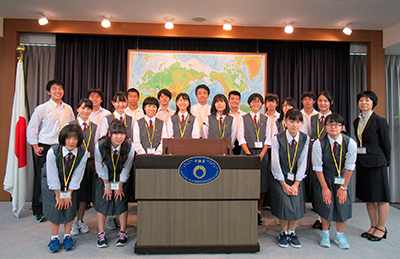 Visits by elementary, junior and senior- high school students to MOFA: Students from Fuji Senior High School
Visits by elementary, junior and senior- high school students to MOFA: Students from Fuji Senior High School (October 23, Tokyo, MOFA)
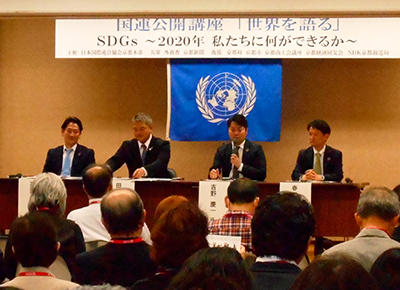 Lectures on International Situations
Lectures on International Situations (November 6, Kyoto Shimbun Culture Hall, Kyoto City)
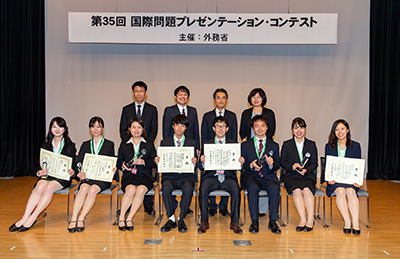 International Issue Presentation Contest
International Issue Presentation Contest (October 5, Nihonbashi Social Education Center, Tokyo)
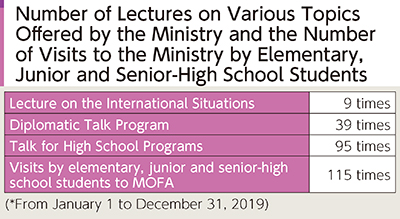
MOFA also introduces Japan's ODA policies and specific measures to the public through various symposia, lectures, and “ODA Delivery Lectures” in which MOFA officials take part (33 lectures in 2019).
Additionally, MOFA publishes the periodical journal “Diplomacy,” sharing information on discussions taking place in various areas and at various levels concerning diplomacy and international affairs relevant to Japan widely. In 2019, the journal featured numerous papers written by renowned domestic and overseas experts on a variety of foreign diplomacy issues, including the U.S.-China relations and the situation in Northeast Asia, in addition to the G20 Osaka Summit and TICAD7.
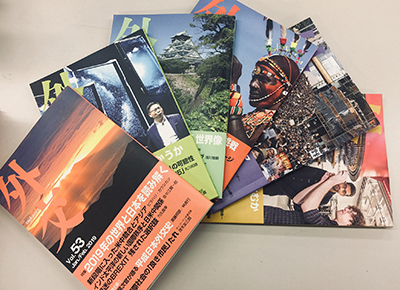 Periodical Journal “Diplomacy”
Periodical Journal “Diplomacy”Moreover, MOFA also makes various pamphlets in order to promote further understanding on the organizational structure and foreign policies of MOFA in an understandable manner. In addition to the above, MOFA accepts individual public opinions through various ways, including the websites of MOFA and the office of the Prime Minister of Japan, and the web system of e-Government Public Comment Procedure (“e-Gov”). Comments and opinions from the public are accordingly shared in MOFA and used as a reference in policy making and planning.
(5) Promotion of the Declassification of Diplomatic Records and Access to Information
To further enhance the public understanding of and confidence in Japan's foreign policy, MOFA is actively engaging itself in the smooth transfer of records and their declassification. In addition, MOFA has been engaged in efforts to facilitate greater convenience in the public use of diplomatic documents.
MOFA preserves more than 120,000 historical materials, including 40,000 prewar historical documents in its diplomatic archives and has declassified its postwar diplomatic records since 1976 as a voluntary initiative. The Rules on the Declassification of Diplomatic Records, which were established in May 2010, stipulate: (1) the declassification of diplomatic documents created more than 30 years ago in principle and (2) the establishment of the “Committee for the Promotion of the Declassification of the Diplomatic Records” which is chaired by the State Minister for Foreign Affairs or the Parliamentary Vice-Minister for Foreign Affairs as well as attended by external experts, to further promote the declassification of diplomatic records and improve its transparency. The number of files which have been transferred to the Diplomatic Archives and made public since then reached approximately 33,000 by the end of 2019.
Furthermore, MOFA discloses information pursuant to the Act on Access to Information Held by Administrative Organs, while giving considerations to national security, the relationship of mutual trust with other countries, the impact on diplomatic negotiations, and the protection of personal information. In 2019, MOFA received 890 requests for disclosure, and documents totaling 224,505 pages were disclosed.
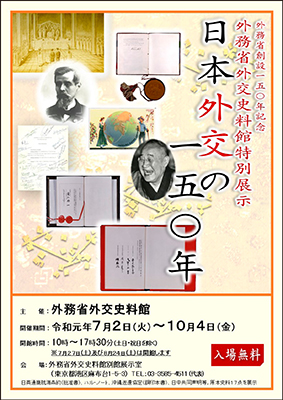 Exhibition poster
Exhibition posterOnce or twice a year, the Ministry of Foreign Affairs (MOFA) holds special exhibitions at its Diplomatic Archives Exhibition Hall. Those exhibitions display items related to anniversary events of the Ministry, or those related to incidents and people in diplomatic history.
The year 2019 marked the 150th anniversary of the foundation of MOFA. In commemorating the anniversary, a special exhibition “150 Years of Japanese Diplomacy” was held from July 2 to October 4. This exhibition displayed documents of treaties and records of negotiations between Japan and foreign countries during the last 150 years.
The exhibition was held in two sections. The first section introduced the history of Japan's diplomatic activities from the late 19th century to the 1970s. The documents displayed in this section included: the “Anglo-Japanese Treaty of Commerce and Navigation (1894)” that brought significant progress to the revision of the Unequal Treaties which had been a diplomatic issue since the foundation of MOFA; the “Hull note (1941)” presented by U.S. Secretary of State Cordell Hull at the final stage of the negotiations with Japan before the outbreak of the Pacific War; the “Resolution concerning Japan's admission to the UN (1956)” which signified the return of Japan to the postwar international community; the “Agreement between Japan and the United States of America Concerning the Ryukyu Islands and the Daito Islands (1972),” among others.
The second section introduced various international issues Japan tackled as a member of the international community and a postwar major economic power under the frameworks for international cooperation. This section displayed telegrams of the G7 Summit proceedings (1978), currency and postage stamps issued by other countries in commemorating Japan's ODA support, the Agreement between Japan and the Republic of Singapore for a New-Age Economic Partnership (2002) which highlighted a new economic diplomacy of Japan in the 21st century, the Paris Agreement (2015) which showed Japan's initiatives toward climate change, and other issues.
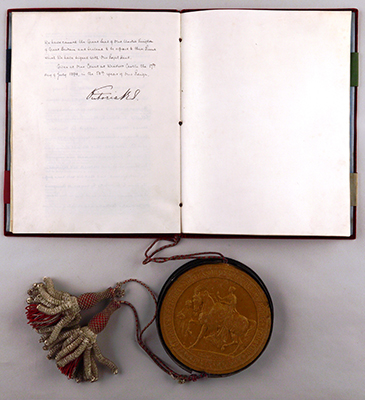 The Anglo-Japanese Treaty of Commerce and Navigation (Ratified)
The Anglo-Japanese Treaty of Commerce and Navigation (Ratified)Visitors to the exhibitions gave feedback such as “It was great to learn about 150 years of diplomatic history through historical documents,” “Seeing directly the things that I have learned at school gave me a deeper understanding of the contents,” “It was great to see with my own eyes the original and valuable historical documents,” and “It made me think how Japanese diplomacy should be in the new Reiwa era.”
Since its establishment, MOFA has engaged in various diplomatic activities to protect the interests of Japan and the Japanese people in the international community. The current diplomacy is based upon those past experiences. We hope that this exhibition provided an opportunity to consider the future of Japanese diplomacy and the international community.
MOFA will continue to make efforts in promoting public understanding of Japanese diplomacy by preserving, managing, and encouraging the use of important historical documents.
Diplomatic Archives
1-5-3 Azabudai, Minato-ku, Tokyo 106-0041
Opening hours: 10:00 a.m. – 5:30 p.m. (Excluding Saturdays, Sundays, national holidays, and year-end and New Year holidays. Temporary opening hours available. For details, please see the website: https://www.mofa.go.jp/about/hq/record/index.html)


